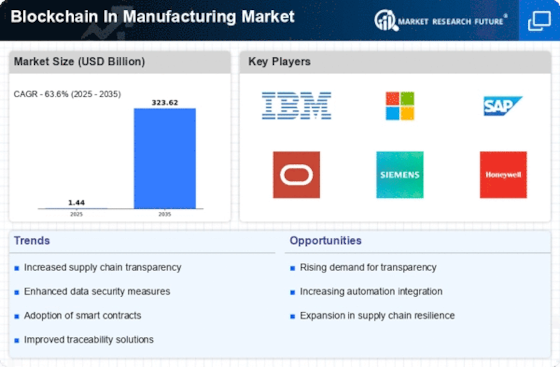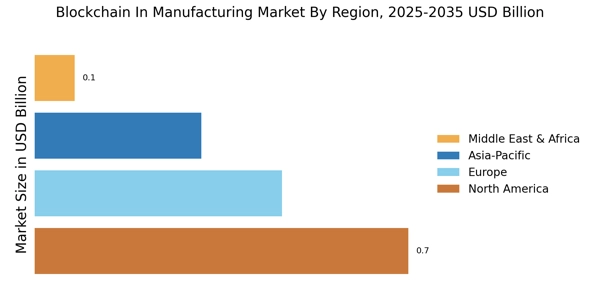Cost Reduction and Efficiency Gains
Cost reduction remains a pivotal driver in the Blockchain In Manufacturing Market. By automating processes through smart contracts, manufacturers can significantly decrease administrative overhead and transaction costs. The integration of blockchain technology can streamline operations, reducing the time required for reconciliation and dispute resolution. Reports indicate that companies adopting blockchain solutions can achieve cost savings of approximately 20 to 30% in supply chain management. This efficiency not only improves profit margins but also allows manufacturers to allocate resources more effectively, thereby fostering innovation and competitiveness in the market.
Enhanced Traceability and Accountability
The Blockchain In Manufacturing Market is increasingly driven by the need for enhanced traceability and accountability in supply chains. As manufacturers face growing pressure to ensure product authenticity and compliance with regulations, blockchain technology offers a decentralized ledger that records every transaction. This capability allows stakeholders to trace the origin of materials and components, thereby reducing the risk of fraud and counterfeiting. According to recent estimates, the implementation of blockchain solutions can reduce supply chain discrepancies by up to 30%. This level of transparency not only builds consumer trust but also enhances operational efficiency, making it a critical driver in the Blockchain In Manufacturing Market.
Regulatory Compliance and Risk Management
Regulatory compliance is a crucial concern for manufacturers, and the Blockchain In Manufacturing Market addresses this need effectively. With increasing regulations surrounding product safety and environmental standards, blockchain technology provides a transparent and immutable record of compliance. This capability enables manufacturers to demonstrate adherence to regulations in real-time, thereby mitigating risks associated with non-compliance. Furthermore, the ability to quickly access and verify compliance data can reduce the time and costs associated with audits. As regulatory landscapes evolve, the demand for blockchain solutions that facilitate compliance is likely to grow, positioning this technology as a key driver in the market.
Increased Demand for Sustainable Practices
Sustainability is becoming a focal point in the manufacturing sector, and the Blockchain In Manufacturing Market is responding to this trend. Consumers and businesses alike are increasingly prioritizing sustainable practices, and blockchain technology can enhance the traceability of sustainable sourcing. By providing a transparent record of the supply chain, manufacturers can demonstrate their commitment to sustainability, which is becoming a competitive differentiator. Studies suggest that companies with robust sustainability practices can see a 10 to 15% increase in customer loyalty. As the demand for sustainable products rises, blockchain's role in ensuring ethical sourcing and production practices is likely to expand.
Collaboration and Innovation Among Stakeholders
Collaboration among industry players is a vital driver in the Blockchain In Manufacturing Market. As manufacturers seek to innovate and improve their supply chains, partnerships with technology providers and other stakeholders become essential. Blockchain facilitates secure and efficient data sharing, enabling collaborative efforts that can lead to new business models and improved product offerings. The ability to share information seamlessly across the supply chain can enhance innovation and responsiveness to market changes. As companies recognize the value of collaboration, the adoption of blockchain technology is expected to accelerate, further propelling growth in the market.
















